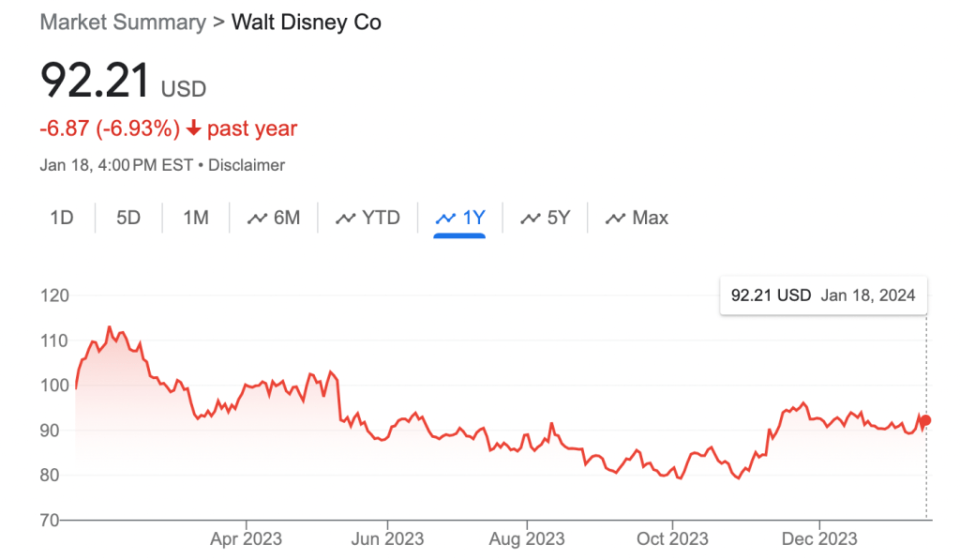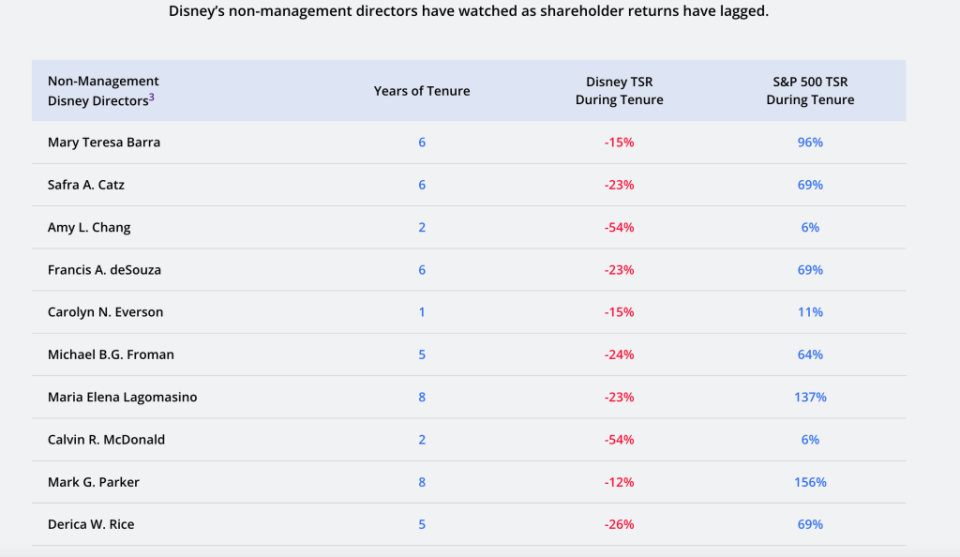Disney’s Proxy Fight: Activist Investors Pose ‘Major Hurdle’ for Nelson Peltz
- Oops!Something went wrong.Please try again later.
Nelson Peltz is officially waging his proxy war against The Walt Disney Company — but it is starting to sound like background noise to Wall Street.
After Disney formally rejected Trian Fund Management’s board nominees ahead of its 2024 annual meeting, the activist investor on Thursday outlined his goals to “restore the magic” at the entertainment giant.
Peltz and Trian have argued that Disney has “woefully underperformed its peers and its potential,” which they blame on a board that is “too closely connected” to long-tenured CEO Bob Iger, “too disconnected from shareholders’ interests,” and that “lacks objectivity as well as focus, alignment, and accountability.”

Disney shares have rebounded to $92.21 apiece as of Thursday’s close after a nine-year low hit in August, but the company’s stock remains well off its all-time high of $201.91 in March 2021. Its market capitalization sits at $168.7 billion, about half its peak of $328.02 billion in 2020. And boosting Disney’s financial picture isn’t the company’s only hurdle as it navigates a difficult environment plagued by a declining linear TV business, an unprofitable streaming segment and box office struggles.
But despite much uncertainty surrounding Disney, Peltz’s chances of prevailing in his campaign are slim, especially now that activist investors ValueAct Capital and Blackwells Capital have entered the fray, Wall Street analysts and corporate governance experts told TheWrap.
“In a proxy battle of such a large scale, allies are imperative,” said Steve Segal, a shareholder in Buchalter’s Denver office and a member of the firm’s Corporate Law Practice Group. “ValueAct and Blackwells’ support for Disney in this fight is a major hurdle for Peltz.”
Restoring the magic
The 81-year-old activist investor has enlisted former Disney chief financial officer Jay Rasulo in his quest for two board seats at the House of Mouse. Also backing the campaign is former Marvel Entertainment chairman Ike Perlmutter, who has given control of his Disney voting shares to Peltz and Trian — bringing the firm’s total stake to about $3 billion.
On its campaign website, Trian states that Iger has sold more than $1 billion in company stock since 2005 and now owns about $19 million worth, while non-management directors collectively own only $14 million in Disney stock. Peltz and Trian argue that Disney’s total shareholder returns relative to the past decade are down 168% compared to the S&P and 401% compared to its media peers through the period ending Oct. 6, 2023.



“It is unfortunate that a company as iconic as Disney and with so many challenges and opportunities has refused to seriously engage with us, its largest active share owner, about board representation,” Peltz and Trian wrote in their proxy statement. “Instead of having a boardroom that would include directors with an ‘ownership mentality’ that can bring fresh perspectives to the Company’s challenges, Disney is resisting change and asking shareholders to endorse a Board comprised mainly of legacy directors (and their hand-picked successors).” Those officers “have repeatedly failed to properly plan for CEO succession, misaligned the incentives of management, and failed to oversee or drive a strategy to get the streaming business to profitability or the studios to produce good content,” he said.
In an interview with Peltz on Thursday, CNBC’s Jim Cramer pointed out that Trian has had multiple conversations with Disney over the past several months, as indicated in the proxy filings. But Peltz said he would be taken more seriously with a board seat.
“When you’re on the board, you have a vote. People need to listen to you, management need to hear your position,” he said. “They offered me to come on board last year as a guest visitor on occasion. That’s not going to do it.”
Peltz added that he recently visited Disney’s Orlando theme parks and said that it needs “more capital invested,” citing competition from Comcast’s Universal, which has a new Orlando park expected to open in summer 2025. “This is where all the value in the stock resides,” he said.
Trian’s list of goals for Disney and its board include:
Adopt best-in-class governance; finally complete a successful CEO succession; and align management pay with performance
Target and achieve Netflix-like profit margins of 15-20% by fiscal year 2027
Commit to a reasonable, defined payback period and return profile on ESPN Flagship DTC and communicate it in detail prior to launch
Board-led review of creative processes and structure to restore leadership accountability and reclaim #1 box office position w/ leading economics
Execute on a clear vision for parks targeting at least high-single digit operating income growth to ensure adequate returns on about $60 billion of capital expenditure
“We will have much more to say about these goals and the initiatives necessary to achieve them when we release our full presentation to shareholders,” Peltz added.
The House of Mouse hits back
In its rejection of Trian’s nominees, Disney’s board said that Peltz had “not actually presented a single strategic idea,” and that the activist investor “seemed oblivious to the ongoing secular change in the media industry.” The board also picked on Peltz’s lack of entertainment business experience, and indicated that his partnership with Perlmutter raised questions about Peltz’s “agenda as a director.”
As for Rasulo, who exited Disney in 2015 after spending three decades at the company, the board said that his “outdated perspective on the business would be damaging to the ongoing strategic transformation underway.” The board also noted that Rasulo’s close relationship with Perlmutter and the fact that Rasulo had not been chosen as Disney’s CEO would make it tough for him to work constructively with Iger and other executives “with whom Mr. Perlmutter had clashed.”
Disney, which declined to comment on Trian’s latest filing, has recommended that shareholders vote for its 12 board nominees, who reflect an “ongoing commitment to a strong Board focused on the longterm performance of the company, strategic growth initiatives, the succession planning process and increasing shareholder value.” Its slate includes Mary Barra, Safra Catz, Amy Chang, Carolyn Everson, Michael Froman, Iger, Maria Elena, Lagomasino, Calvin McDonald, Mark Parker and Derica Rice, as well as recent appointees James Gorman and Jeremy Darroch.
In its own preliminary proxy filing, Disney reiterated its four core pillars: achieving significant and sustained profitability in streaming, turning ESPN into a “preeminent digital sports platform,” improving the output and economics of its film studios and turbocharging growth in its Experiences segment (which includes parks, resorts and cruise ships). The company is on track to achieve $7.5 billion in cost savings, declared a cash dividend of $0.30 per share for the second half of fiscal year 2023, and has established a special succession planning committee to find a replacement for Iger, whose contract is up at the end of 2026.
For fiscal year 2023, its compensation committee set the portion of the CEO’s long-term incentive award comprised of performance-based restricted stock units (PBUs) at 60%, up from 50% in fiscal 2022. Disney’s named executive officers (NEOs) also forfeited 100% of PBUs for fiscal 2020 and 2021 because total shareholder return fell below the minimum performance threshold in fiscal 2023.
Enter activist investors

Disney has reached an info sharing agreement with ValueAct Capital that will allow the activist investment firm to consult on strategic matters with Disney’s management and board of directors. The company’s turnaround effort has also received public support from Blackwells Capital, which has called on Peltz to “end his peacocking” so that the company can “focus on its bright future, and not be dragged backward in times.”
ValueAct, which began building a “significant” undisclosed stake in Disney during the summer, has experience investing in media and technology companies navigating significant business transformations, such as Spotify, The New York Times, 21st Century Fox, Nintendo, Microsoft, Adobe and Salesforce.
“They are the most credible player in the activist space,” Jeffrey Sonnenfeld, the founder and CEO of Yale School of Management’s Chief Executive Leadership Institute, told TheWrap. “Not only do they not have ego and grandiosity involved, but they have a lot of respect among peers and a far better track record [than Peltz and Trian]. They actually know this space and have a great constructive relationship for working with boards.”
The firm “will try to use its own and Iger’s influence to lay down the groundwork for a more conservative business model for the entertainment giant in the long run,” Investing.com senior analyst Thomas Monteiro told TheWrap.
Earlier this month, ValueAct Capital CEO Mason Morfit told activist investing research firm 13D Monitor that Disney’s parks and consumer products business is a high-return asset that can provide an “extra window” to monetize stories and IP — a cash flow boost its streaming competitors Netflix, Warner Bros. Discovery and Paramount Global don’t have. It values the division at $80 per share.
Morfit also anticipates that the streaming wars will soon come to an end.
“At this point, I think everyone can admit that 13 different major streaming services all going it alone was a big mistake,” he added. “In the future, there will be fewer streamers with bigger bundles of content that are easier to access.”
Morfit acknowledged that he’s previously sought counsel from Iger on ValueAct’s investments in media companies such as Nintendo and The New York Times, calling the Disney CEO’s track record “pretty much unparalleled.”
“We are going to help him as best we can,” he said.
The ‘lesser of two evils’
While Blackwells views Disney’s current leadership as “invaluable” to shareholders, the firm has proposed an increase in the size of the board and offered its own trio of nominees: former Warner Bros. and NBCUniversal executive Jessica Schell, Tribeca Film Festival co-founder Craig Hatkoff and TaskRabbit founder Leah Solivan.
“This campaign provides shareholders a necessary alternative to what would otherwise be a solipsistic sideshow,” the firm said.
Jason Aintabi, Blackwells’ chief investment officer, slammed Disney’s agreement with ValueAct as a “disappointing defensive move” that “does not solve for anything.”
Blackwells’ proposal for three board seats is “a tough pill to swallow, but one that may have a higher likelihood of support,” given that they are interested in expanding the board to keep Disney’s incumbent directors, Segal said. Blackwells is a value investor that is “going to want to see changes at Disney to improve shareholder value.”

But on Tuesday, Disney rejected Blackwells’ nominees and proposal, noting that “overriding the results of an election of directors would not be in the best interests of the Company and our shareholders.”
The board said Hatkoff had no experience with large, public media entertainment companies, nor with consumer-facing businesses like theme parks, cruises and experiences.
Schell, the board added, has no experience as a director of a public or operating company and would not be considered an independent director under the New York Stock Exchange’s rules nor the company’s corporate governance guidelines, citing her brother and entities he’s affiliated with having “ongoing contractual business relationships with the Company.”
Disney’s board also noted that Solivan has never served as a director on any company board.
While acknowledging that ValueAct’s support and endorsement of Iger’s strategy was a “strong move,” Segal warned he may need to “strike a a deal with the faction he views as the lesser of two evils” if he cannot secure enough shareholder support for Disney’s board nominees.
“Blackwells is certainly positioning itself as that alternative,” Segal said.
Restless Disney investors
The involvement of Trian, ValueAct and Blackwells speaks to “restlessness” among Disney investors, Rosenblatt Securities analyst Barton Crockett told TheWrap.
“There’s a feeling that Disney is iconic, and should be doing well, but frustration that it’s had issues,” Crockett said. “That said, it doesn’t feel today like Peltz will succeed. Investors see the positives that can come, and that makes it harder for Peltz.”
However, he acknowledged that institutional investors “know, remember and respect” Rasulo and that Peltz has “catapulted his credibility to a better place” by bringing him on board.
While investors will likely view the activists’ effort to improve accountability favorably, their divergent interests may result in the process “devolving into a distraction rather than being constructive,” Barclays Capital analyst Kannan Venkateshwar wrote in a note to clients on Wednesday.
“In the interim, we suspect there is significant management attention being diverted towards the proxy battle instead of operations, at a time when the company faces critical strategic decisions which could shape the narrative for years to come,” he said.
It doesn’t feel today like Peltz will succeed. Investors see the positives that can come [for Disney], and that makes it harder for Peltz.
Rosenblatt Securities analyst Barton Crockett
Given the breadth of issues Disney faces, Venkateshwar said that “the typical activist playbook of cost cuts, asset sales and capital returns is unlikely to be useful to change the narrative in any material way.”
Over the long term, the analyst said, “Disney is likely to be potentially one of the only legacy media companies with a revenue growth story. However, given the large number of issues that investors have to contend with in the interim, it is tough to see how multiples or estimates go up materially.”
A compelling case but a long shot
While obtaining a board seat will be an uphill battle, Charles Elson, founding director of University of Delaware’s Weinberg Center for Corporate Governance, believes Peltz and Trian have a “compelling case” when it comes to Disney’s recent performance and corporate governance challenges. Especially as it pertains to succession planning.
“The fact that it took the threat of a proxy fight to force changes is certainly not helpful to Disney,” he said.
But given the forces standing in Peltz’s way, a Trian victory is “an even longer shot at this point,” Monteiro said. “However, in the longer term, I do think the possibility remains in the cards. But it will depend on many leadership shifts and a more prolonged battle.”
Segal says Rasulo’s involvement adds legitimacy to Peltz’s fight, noting that his “decades of experience in the organization allow him to walk in understanding the company’s strengths and weaknesses at a core operating level.”
But Sonnenfeld argues that Rasulo is “looking to settle scores and get back in the action.” He touted Iger’s “very good progress” in restructuring, removing inefficiencies and working on streaming profitability.
“Iger is right on track and I think he’d be able to explain to the board that when you benchmark him against any other returning general like he is, he’s doing quite well,” he said.
In the end, the outcome will ultimately rest in the hands of Disney’s bigger institutional investors like BlackRock, Vanguard Group and State Street and index funds. But Elson points out that Peltz was previously able to win in uphill proxy battles at Procter & Gamble and Heinz and that he may not even need a board seat for Disney to make positive change.
“Sometimes you win by losing and a good board will understand that and react appropriately,” he added. “We’ll have to wait and see.”
The post Disney’s Proxy Fight: Activist Investors Pose ‘Major Hurdle’ for Nelson Peltz appeared first on TheWrap.

